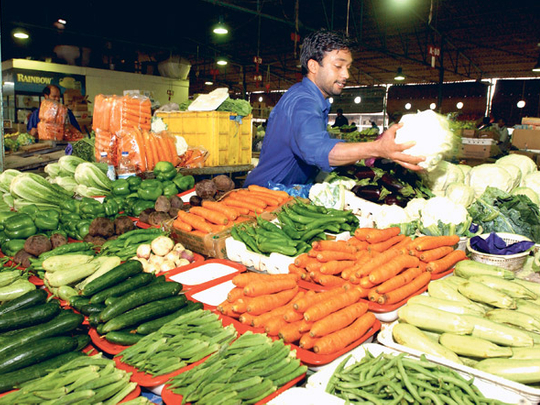
Dubai: Fruits and vegetables exceeding maximum residue limits (MRL) of pesticides will be banned from importation into the UAE by May 15 to protect human health, officials said on Monday.
The Ministry of Climate Change and Environment (MOCCAE) issued an advisory noting that it has “banned imports of certain vegetables and fruits from select countries with effect from May 15, 2017 as those products have been found to contain pesticide residues in excess of permissible limits".
"The countries that will be impacted by the ban include Egypt, Oman, Jordan, Lebanon and Yemen,” the ministry announced on Monday.
Unacceptable levels of pesticides in food imports were last reported in the UAE from India in May 2016 prompting similar concerns of safety,
On Monday, the ministry did not reveal the degree to which some fruits and vegetables exceeded proper maximum tolerance levels of pesticides.
Residue levels
Maximum residue levels (MRL) for pesticides are set by the Codex Alimentarius Commission (CAA), a regulatory body governing food safety for the United Nations and World Health Organisation, and adopted by countries around the world.
“The maximum permitted levels of pesticide residues in foods are stipulated by regulatory bodies in the UAE. Exposure of the general population to such residues most commonly occurs through the consumption of treated food sources,” the ministry said in a statement.
“Many of these residual chemicals, especially derivatives of chlorinated pesticides are capable of bioaccumulation and can build up to harmful levels in the body as well as in the environment.
"Persistent chemicals get magnified throughout the food chain and have been detected in products ranging from meat, poultry, and fish, to vegetable oils, nuts, and various fruits and vegetables,” it added.
List of produce
Some of the foods to be banned include “all varieties of pepper from Egypt, pepper, cabbage, cauliflower, lettuce, squash, beans and eggplant from Jordan, apples from Lebanon, melons, carrots and watercress from Oman and all types of fruit from Yemen are on the list of banned produce,” the ministry said.
Countries named in the ban have been been requested by the UAE to provide a certificate of analysis of pesticide residues for all other vegetables and fruits stating that they are free of such residues as of May 15, 2017.
The ministry said that the ban “on the above mentioned produce will continue until the necessary safety requirements are met and pesticide residues are cleared.”
The UAE assured the public that it relies on sound testing results delivered by accredited laboratories British Commission for Accreditation (UKAS) which meets all international standards, the ministry said.
“Food safety is a core priority of the UAE’s food security system ... the ministry is also keen to ensure that all foodstuffs and products in the country, both domestically produced and imported, are safe for consumption,”
UAE shares US protection laws
In the United States, the Environmental Protection Agency (EPA) also protects human health similar to the UAE by imposing strict regulations to limit residual pesticides which if violated, food stuffs are seized or banned from importation.
No numbers are provided on the EPA website given the multitude of chemicals used but the EPA says “if residues are found above that level, the commodity will be subject to seizure by the government ... In setting the tolerance, EPA must make a safety finding that the pesticide can be used with “reasonable certainty of no harm.”
To make this finding, EPA considers the toxicity of the pesticide and its breakdown products, how much of the pesticide is applied and how often, and how much of the pesticide (i.e., the residue) remains in or on food by the time it is marketed.
EPA ensures that the tolerance selected will be safe. The tolerance applies to food grown in the US and imported food.”












